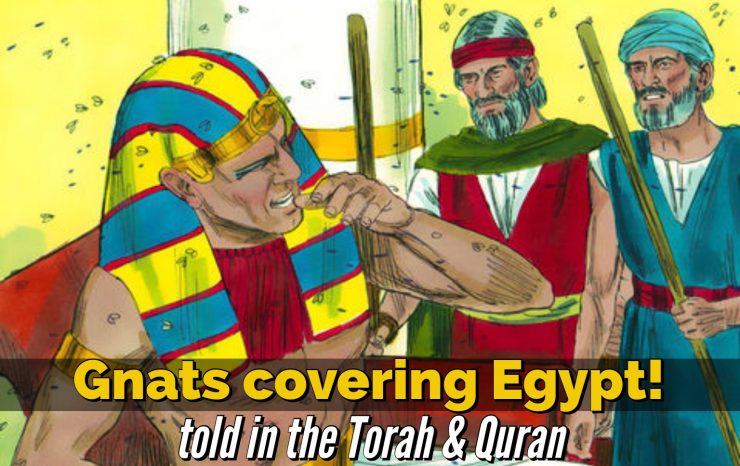The Almighty God brings the example of a gnat to our attention yet on the fifth page of the Quran. He repeats in several verses that the Quran is a Book that attests confirmation to the true information in previous resources. The gnat is, in fact, an important example that is set within this context:
God does not shy away from making an example of a gnat or anything beyond it. Those who trust in God know that it is a true example from their Master. As for those who ignore, they say: “What might God have intended by giving such an example?” Thus, He calls many of them ‘astray’ and many of them ‘rightly guided’. Those who He calls ‘astray’ are only the deviant (The Quran 2:26).
If God begins this verse by emphasizing that “God does not shy away from anything”, an earlier incident had presumably occurred. As the Quran does not have another verse mentioning a gnat, it brings to mind that the reason why it is included in this Book might be establishing relation with another Book. Nonetheless, there is a similar verse which might be associated with this gnat example:
“O, people! An example is being presented to you, so listen to it carefully: Those who you interposed between you and God will never create even a fly, even they assembled for that. If a fly steals from them, they cannot get it back. Weak is the seeker and the one sought” (The Quran 22:73).
Perhaps, by verse 2:26, God gives the answer “you did not accept the example of a fly, but God may even use a minor creature rather than a fly to set an example” to those who did not like the example of a fly in verse 22:73.
Referral of the Quran to a gnat that is smaller than a fly, will indeed satisfy the Experts of the Book who trust in God:
“God does not shy away from making an example of a gnat or anything beyond it. Those who trust in God know that it is a true example from their Master…” (The Quran 2:26).
Why do Experts of the Book feel content when they hear the example of gnat from a person who claims to be the messenger of God? It is imperative to examine the Torah in this regard. In the second book of Torah (Exodus), Moses and Aaron convey the commands of God to Pharaoh to terminate the torture to Children of Israel and permit them to leave Egypt. As Pharaoh insistently responds negatively, Moses and Aaron begin to exhibit God’s miracles by His will and order. One of these miracles involves mosquitoes/gnats:
Then the LORD said to Moses, “Tell Aaron: Stretch out your staff and strike the dust of the earth, and it will become gnats throughout the land of Egypt. So Moses and Aaron did just as the LORD had commanded them. When Aaron raised his hand and struck the ground with his staff, gnats infested the entire land, covering the Egyptians and their animals. All the dust in the land of Egypt turned into gnats. (Pharaoh’s) magicians tried to do the same thing with their secret arts, but this time they failed. And the gnats covered everyone, people and animals alike. “This is the finger of God!” the magicians exclaimed to Pharaoh. But Pharaoh’s heart remained hard. He wouldn’t listen to them, just as the LORD had predicted (Exodus 8:16-19).
As we observe in the previous passages of Exodus, while Moses and Aaron were demonstrating the miracles such as transforming the staff into a snake, turning the waters of a river to blood, or the frog plague; the magicians of Pharaoh who possess high occupations within the community, tried to imitate those miracles. Although they generated resembling performances of some of the miracles, they could not even perform a counterfeit representation of the gnat miracle. This miracle made magicians believe that it is God who is doing these:
(Pharaoh’s) magicians tried to do the same thing with their secret arts, but this time they failed. And the gnats covered everyone, people and animals alike. “This is the finger of God!” the magicians exclaimed to Pharaoh (Exodus 8:18-19).
Having emphasized the fact in verse 22:73 that no other being is able to create even a fly, by verse 2:26, God reminds those who did not like the example of the fly that “God may use even a gnat to set an example, and the Experts of the Book will recognize that example very well. Indeed, the rivals of Moses and Aaron had tried to create gnats but they could not do it. You still read this in your Book (Torah)”.
The next verse coming right after 2:26 is:
“The deviant are those who violate the commitment they have made to God after it is covenanted, by cutting what God has commanded to be kept joined, and causing corruption on the earth. They are the losers” (The Quran 2:27).
We do understand the content of the covenant mentioned in this verse by the help of another verse: “God took a covenant from those who were granted the Book (saying): “You will make It manifest to mankind and never conceal It” (The Quran 3:187).
It is significant that the verse 2:27 coming right after the one that exemplifies the gnat is a reminder to the covenant made with God. As this covenant is about revealing the bonds between this Book and the previous ones through sharing the necessary information to build this bond, its significance becomes much higher.
On the other hand, we see that instead of questioning God in concern of what He has given an example from, we must search and go through the depths of His words. As can be seen in this instance, God is the One who knows what and where to make mention of anything. He may refer to a “gnat or anything beyond it”. The word we translate as “beyond” is a significant detail to focus on. This word allows us to understand that the examples to be given in this divine book may be beyond a gnat in several aspects, such as size, complexity, benefits/harms, etc. It is significant that God uses the word “beyond” rather than “smaller than” while referring to His examples, which is in fact another emphasis put on their variety and diversity.
We see once again that God’s Book is far from having flaws and it has a miraculous language. The thing which matters is to comprehend the importance of His examples.








Add comment